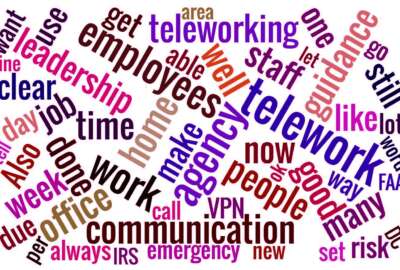 Data Dive
Data Dive DOJ instructs state, local law enforcement to excuse feds traveling for work from lock downs
The Justice Department sent guidance to state and local law enforcement telling them to allow federal employees to travel to and from work during lock down.
Despite lock downs and travel restrictions that are beginning to spread across the country, many federal employees still need to go into work to provide essential services. That’s why, on March 20, the Office of Attorney General William Barr sent a memo to all U.S. attorneys instructing them on how to deal with federal employees traveling to and from work during a lock down.
Margaret Weichert, deputy director for management at the Office of Management and Budget, shared the memo on Twitter on March 21.
Attorney General @TheJusticeDept issued memo to US Attorneys for state & local law enforcement. Feds & contractors working #missioncritical jobs can show #PIV or #CAC cards when commuting to work @OMBPress @USOPM @PerformanceGov pic.twitter.com/USHG1H4nsk
— Margaret Weichert (@Weichert45) March 21, 2020
Joanna Friedman, partner at the Federal Practice Group, told Federal News Network that she’s not familiar with any precedent for this kind of thing, but ultimately, it’s within the federal government’s right to overrule lockdowns and order employees to work.
“The bottom line is federal employees are federal employees,” she said. “The government gets to direct them on what to do. State borders and laws are not going to be able to trump what the feds are requiring.”
Former Virginia Attorney General Jerry Kilgore told Federal News Network that this is a unique situation government at all levels is trying to deal with.
“We’re in a new world. We all have emergency response training for issues at state and local levels. This is different,” Kilgore said. “We’re used to tornadoes, hurricanes, flooding. Even something as bad as 9/11, we’ve all had training in terrorism. But nothing biological like this.”
But while the specific scenario is unprecedented, training and experience from dealing with those situations have created an information-sharing infrastructure specifically for disseminating this kind of guidance. Earlier this week, Kilgore said, the information from the memo should have started filtering down from U.S. attorneys to local law enforcement officers who would be interacting with federal employees during lock downs. He said that process can take anywhere from 24 hours to two days, depending on the individual offices.
The issue here, Friedman said, is whether there’s any disparity in who is being required to come in to work. Federal law enforcement, first responders and medical staff obviously can’t work from home.
But many other federal employees have expressed frustration with what they see as unnecessary telework restrictions at their agencies. There have been cases, Friedman said, where agencies put stipulations on telework, like requiring employees to have certain devices to work from home, and then refusing to supply those devices.
In other cases, the employee could have a preexisting medical condition, for which they should provide documentation to their agency when requesting telework.
In cases like that, “it’s the employee’s right to push back and make management provide a logical explanation why their presence is needed in the office, or why the travel is necessary,” she said.
If an agency isn’t accommodating, employees should always try internal resolution first, Friedman said. That’s going to provide the most immediate improvements to the employee’s situation, if it works.
“If that’s not bringing the resolution the employee is seeking, they should raise the issue with the agency’s Office of General Counsel, and make sure they’re aware of what’s going on,” she said.
That’s because there could be legal ramifications to the issue. After that, it may be appropriate to file a complaint with the agency’s Equal Employment Opportunity office, or even the office of Inspector General, especially if the employee feels they’re being singled out. But those remediation paths will take significantly longer to resolve.
In the meantime, it’s important for employees to comply with the agency’s instructions while going through these processes, Friedman said. Otherwise they could be charged with insubordination.
Copyright © 2025 Federal News Network. All rights reserved. This website is not intended for users located within the European Economic Area.
Daisy Thornton is Federal News Network’s digital managing editor. In addition to her editing responsibilities, she covers federal management, workforce and technology issues. She is also the commentary editor; email her your letters to the editor and pitches for contributed bylines.
Follow @dthorntonWFED




